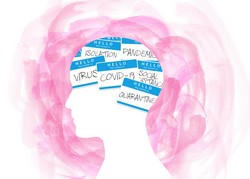The unprecedented COVID-19 pandemic is negatively affecting the well-being of young adults, according to a recent study by the University of Chicago.
According to their COVID Response Tracking Study, 56 percent of Americans aged 18-34 have sometimes felt isolated in the past month, compared to about 40 percent of older Americans. Meanwhile, 25 percent of young adults rate their mental health as fair or poor, compared to 13 percent of older adults. 39 percent of young adults rate their mental health as very good or excellent, compared to 56 percent of older adults.
Monmouth students are no exception when it comes to COVID-19’s impact on young adults. Many find their mental health declining under the weight of the coronavirus.
“I am paranoid and anxious every time I go somewhere with large groups of people. The anxiety worsens when I notice they are not following health guidelines,” said Mercedes Concepcion, a junior business administration student.
Not only have students been apprehensive about the virus itself, but the demands of schoolwork adds new layers of concern.
“Online classes are really bad especially living on campus,” said Samantha Gagnon, a sophomore psychology student. “I feel like professors aren’t really aware of how much they are expecting of students, especially in asynchronous classes where there is really no way to provide feedback.”
“As a grad student, COVID really took a toll on my focus for classwork when we went online,” said Nicholas Morris, a second-year graduate student of English. His three classes are all being conducted online this semester. “It was a hard shift in March but I’m honestly glad they stayed online once we all got a handle on it.”
Students have also noted the social barriers created by the pandemic, citing struggles with isolation and social interaction.
“The isolation of quarantine and now online classes has really made me feel lonely and depressed,” said Katherine Rivera, a senior health studies student. “As someone who already struggles with mental health, it has been extremely hard to cope.”
“Being inside pretty much all day is really hard on all my suitemates and I, especially with no windows in the common room,” Gagnon said. “We’re spiraling.”
To combat spikes in anxiety and depression symptoms, the Centers for Disease Control (CDC) recommends taking breaks from watching or reading news stories about the pandemic, connecting with others, finding time to unwind and relax, and taking care of your body by eating healthy meals, exercising regularly, and getting adequate sleep.
“Daily exposure to news, information, and physical reminders about COVID-19 can produce a range of responses,” states Monmouth University’s Counseling and Psychological Services (CPS) on their website. “Reactions can be complicated for students with loved ones in affected areas of the world, friends and family in the health professions, and dear ones experiencing health emergencies. Students might experience emotional, somatic, or behavioral changes and can impact physical, mental, and emotional health.”
CPS also offers resources and support on areas such as anxiety and stress management, guided meditation, mindfulness, and living with mental illness during COVID.
GRAPHIC MADE by Angela Mascia


